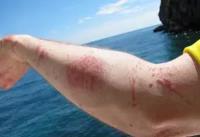 Add My Company
Add My Company
Sign In
How To Treat A Jellyfish Sting?
11-09-2023

Jellyfish stings are a pain, in more ways than one. If you have ever been stung by a jellyfish you know that it can be really irritating and it is hard to find relief from the pain. Treatment for a jellyfish sting revolves around pain relief or healing allergic reactions if they occur.
The sting is in the tentacles of the jellyfish and they are very sensitive. The sting can be triggered very suddenly to defend themselves or to sometimes catch prey. The venom acts quickly on the victim, be it prey or a passing human. The barbed nature of the venoms cells means they often stick to your skin and need to be removed quickly and carefully to prevent further venom injected.
Jellyfish sting symptoms
Most types of jellyfish stings will cause some discomfort, but some can be life-threatening. Over 500,000 people are stung by jellyfish every year in North America?s Chesapeake Bay alone.
Common symptoms of a jellyfish sting include:
A burning, stinging sensation on your skin.
Tingling or numbness where the sting occurred.
The stung area can turn red or purple.
More severe symptoms of a jellyfish sting include:
Nausea
Dizziness
Vomiting
Difficulty breathing
The severity of your symptoms will depend on what jellyfish you encountered, and how much of your skin is affected by its venom.
The dangerous Lions Mane Jellyfish can cause injuries and severe irritation and stinging. The larger jellyfish have thousands of tentacles that are several meters long, causing multiple stings over a large area of the body.
What happens when you get stung by a jellyfish?
The majority of jellyfish stings can be treated with some basic first aid. The main signs and symptoms after a jellyfish sting is burning, throbbing, and itching. This may spread over the initial infected area as the venom moves through your body.
Other signs and symptoms include tracks or marks where the stings have been.
How to treat a jellyfish sting:
First, remove the sting. It is usually simplest to scrape the sting away with a stick or credit card, something with an edge. Don?t try to rub them off! The stings can still cause irritation even after they are detached from the jellyfish itself, so do not touch the stick or card afterwards.
Next, rinse the affected area with seawater to wash away any remaining strings. Freshwater may trigger the release of more venom if any tentacles remain on the skin.
Heat can help to reduce the pain, so immersing the affected area in warm water, or taking a hot shower right away for at least 20 minutes (the water should be around 43 to 45?C) can also be effective. This may seem counterintuitive but the proteins in the venom from the jellyfish will be broken down by the heat.
Apply a pain-relieving cream like lidocaine to the sting or an over-the-counter painkiller such as ibuprofen as this may help with the itching and pain.
The NHS doesn?t advise using urine or vinegar to treat a jellyfish sting. Plenty of seawater then hot water as said above.
Get to a hospital immediately if you have a severe or life-threatening reaction to a jellyfish sting. A more serious reaction will need to be treated with jellyfish antivenin. This is only available at hospitals.
More serious signs and symptoms that need medical attention include:
If you have a jellyfish sting on your face or genital area, go to the hospital for treatment.
If the stinging is severe and the pain does not subside or there are any other symptoms or more severe reactions, call 999 as soon as possible. Taking a photo of the jellyfish if possible can help medical staff to identify it and give the appropriate treatment.
If you have trouble breathing, swelling of the face, chest pain, vomiting, or severe dizziness then you should go to the hospital immediately.
Important things to remember about jellyfish:
Jellyfish can still harm you even when they?re ?dead? on land as their stings are still harmful. Sometimes they may look dead but are actually beached and are still alive.
If you found this blog useful and are interested in learning more click here to view our blog page.
For more information on How To Treat A Jellyfish Sting? talk to ABC Training Services Ltd
Enquire Now
List your company on FindTheNeedle.

